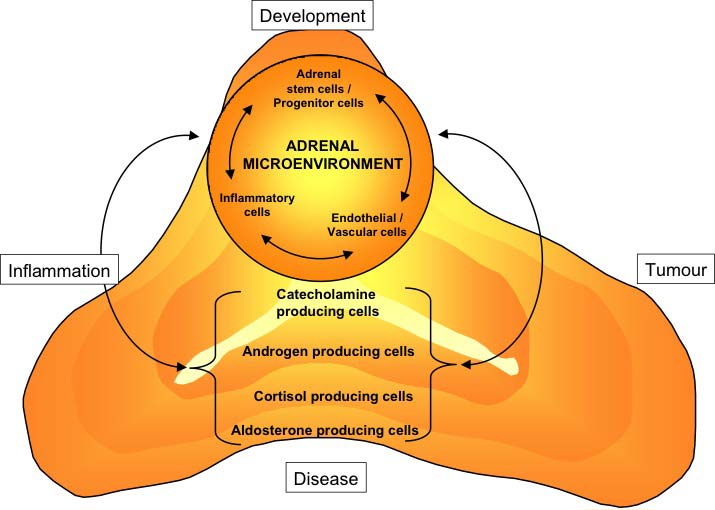Stefan R. Bornstein Group
Intercellular crosstalk in the endocrine system

The unravelling of the human genome and proteome opens new avenues for defining the complex cellular interactions of the neuroendocrine and immune system, and its relevance for disease.
- Defining basic mechanisms and clinical implications of cellular crosstalk in endocrine tissues. We analyse, in a comprehensive manner, the components and mechanisms of this cellular crosstalk by defining the involved receptors, signalling pathways, transcription factors and gene expression profiles. Using the adrenal gland as a model we have demonstrated that tissue integrity, input from the nervous system or intercellular communication is essential for the normal functioning of the gland and the adequate respond to the homeostatic challenges of stress. We have demonstrated that intact intraglandular cellular interactions are required for normal development, differentiation and zonation of the adrenals and that alterations in intercellular communication, local production of neuropeptides, growth factors and cytokines, and aberrant expression of ectopic receptors are implicated in adrenal hyperplasia, autonomic hormone production, tumour formation and dysregulated hormone production. The latter changes often promote the development of metabolic disorders, which affect local and systemic inflammation both by causing enhanced susceptibility to the infectious agents e.g. SARS-CoV-2 as well as by influencing the severity and course of the disease.
- Overweight and obesity and diabetes are increasing at an alarming rate worldwide, reaching alarming epidemic proportion in the westernized world. Obesity is the major risk factor for lipid abnormalities, atherosclerosis, high blood pressure, diabetes mellitus type 2 and certain types of cancer. It is well established now that adipose tissue, besides its role in the deposition and release of fatty acids, is a highly active endocrine organ. We are interested in this endocrine function of adipose tissue and its involvement in the development of obesity associated diseases, especially the influence on the stress system, myocardiocytes and pancreatic beta-cells. We have developed new strategies for the regeneration of metabolic disease and the cure of diabetes. We are the only active centre for islet TX in Germany testing new replacement strategies
Future Projects and Goals
Based on our previous findings we will use integrated approaches in both research areas using a wide array of techniques. This is a logical consequence of our previous work and a translation of basic science into regenerative and clinical medicine.
- How does cellular crosstalk translate into differential intercellular signalling, transcriptional regulation and gene expression?
- Metabolic drivers of infection susceptibility
- What can we learn from transgenic animal models?
- Role of SARS-CoV-2 in the endocrine stress axis
- New therapeutic strategies based on a thorough understanding of this form of integrative medicine.
Methodological and Technical Expertise
- Intra vital microscopy
- Transgenic mouse models
- Organ chamber
- Adrenal 3-dimensional spheroid cultures
- Animal models of systemic inflammation and sepsis
